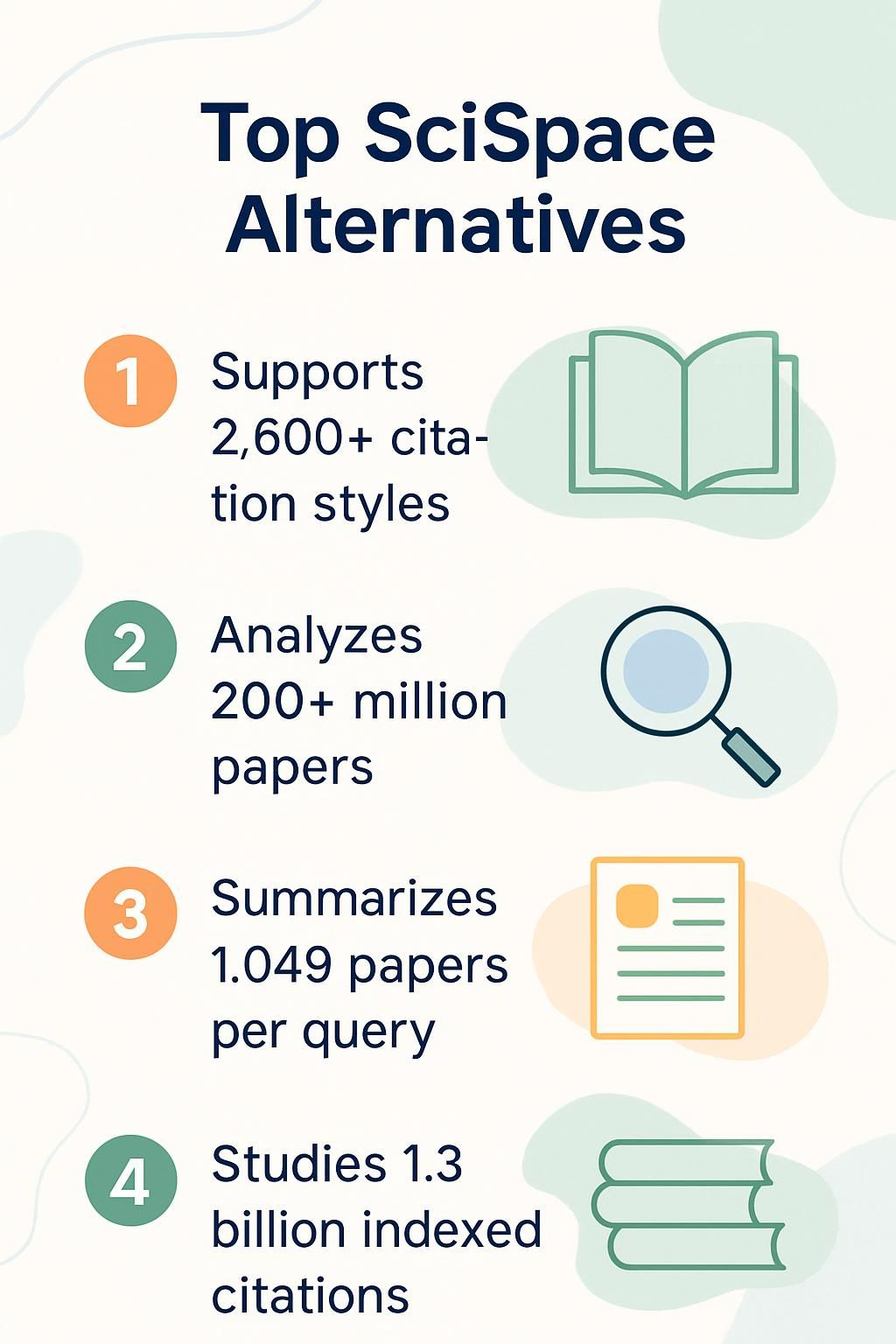Struggling to find the right tools for academic research? Many researchers face challenges with citation styles, writing assistance, and efficient paper organization. This guide will walk you through the best SciSpace alternatives that meet these needs.
Keep reading to discover tools that could change your workflow today!
Key Takeaways
- Many tools like Paperpal and Elicit use AI to simplify academic writing and research. They assist with citation styles, grammar fixes, and organizing data quickly.
- Tools such as Research Rabbit and Semantic Scholar help visualize academic trends or analyze over 200 million papers. Their free plans make them accessible for students.
- Jenni AI supports over 2,600 citation styles and integrates with Zotero/Mendeley. It offers autocomplete features but limits its free plan to 10 PDFs/month.
- Consensus stands out with its “Consensus Meter,” summarizing scientific agreement on topics using up to 1,049 papers in one query.
- Scite validates credibility by studying 1.3 billion indexed citations while linking supported or challenged claims from reliable sources directly into workflows.

Key Features to Look for in SciSpace Alternatives
Finding the right tools means focusing on what matters most to you. Think about features that save time and improve your research experience.
AI-powered research capabilities
AI tools can search huge databases like 200 million papers in Semantic Scholar. They pick the most helpful research, saving time for students and researchers. Elicit adds value by building AI-driven literature reviews and organized tables.
Paperpal relies on a database of 250 million academic papers, offering accurate suggestions fast. Jenni AI’s autocomplete makes writing easier while supporting over 2,600 citation styles.
These features cut effort but boost accuracy when working with systematic reviews or academic papers.
Smart tech isn’t just faster—it’s sharper too.
Citation analysis and reliability
Citation analysis helps check the credibility of research papers. Scite, for example, has indexed 1.3 billion citations to track how sources are supported or challenged. This ensures researchers can quickly spot reliable data and avoid flawed studies.
Tools like Jenni AI integrate well with Mendeley and Zotero for citation management. Paperpal offers support for over 10,000 citation styles alongside a plagiarism checker. These features save time and help maintain accuracy when citing in academic writing.
Writing assistance and grammar tools
Writing tools like Paperpal provide grammar fixes and plagiarism detection. Such features are ideal for academic writing, helping writers spot errors quickly. Jenni AI offers autocomplete for smoother sentence construction and citation generators to manage sources easily.
Both platforms cater to researchers needing clarity and credibility in their work.
QuillBot stands out as an AI paraphrasing tool. Its free plan works well, but the premium version unlocks advanced options for rephrasing complex sentences. These tools ensure polished drafts without breaking a sweat.
Next up, explore collaboration and visualization tools enhancing teamwork efficiency!
Collaboration and visualization tools
Collaborating on research can be tricky, but tools like Research Rabbit make it easier. This platform offers visual mapping of academic networks, which is perfect for teamwork and brainstorming.
Users can explore related papers, spot trends, and share findings with peers in a simple dashboard interface.
Genei Beta takes things further by combining advanced summarization with collaborative features. It allows teams to break down themes within documents and work together seamlessly.
These tools aren’t just functional—they’re also user-friendly for quick adaption in group settings.
Pricing and accessibility
Price matters, and so does access. Paperpal charges $25 monthly or $139 yearly for its Prime plan. Jenni AI offers a free option but limits it to 10 PDFs and 10 chats each month. For full use, pay $30 monthly or $144 annually.
Elicit’s Plus plan costs $12 per month unless billed annually at $10. The Pro version raises this to $42 under annual billing or $49 on a monthly basis. Consensus offers Premium access for just under nine dollars per month if prepaid; otherwise, it’s about twelve bucks, with team discounts available too.
Moving next into “Paperpal,” we’ll explore its standout features and drawbacks!
Paperpal
Paperpal makes academic writing smoother and smarter. Its AI tools can refine your drafts, catch errors, and save time.
Features & Benefits (Paperpal)
Paperpal simplifies academic writing. It combines citation generation, grammar tools, and plagiarism checks in one place. With support for over 10,000 citation styles, it works for any field or journal requirement.
Its AI writer trains on 250 million research papers to provide quick and reliable suggestions.
Prime members can check up to 10,000 documents monthly for originality. Grammar fixes improve clarity fast. A discount code “DZ30” allows users to save 30% on their first Prime subscription payment.
This tool streamlines the writing process without breaking a sweat!
Pros & Cons (Paperpal)
Paperpal provides a range of tools for academics and researchers. It delivers features designed to simplify writing and editing processes. Below is a breakdown of its advantages and disadvantages:
| Pros | Cons |
|---|---|
| Offers comprehensive writing and editing tools for academic needs. | Price at $139/year may feel steep for some users. |
| Compatible with over 10,000 citation styles for convenience. | Free plan has some limitations but lacks detailed specifics. |
| Supports a high plagiarism-checking cap of 10,000/month for Prime users. | Advanced features are locked behind paid tiers. |
| Discount code “DZ30” can reduce costs. | May not be ideal for casual users without frequent academic projects. |
| Trained using a vast corpus of over 250 million academic papers. | Primarily focused on writing assistance, with fewer advanced research tools. |
Jenni AI
Jenni AI shines as a smart writing assistant with AI-driven tools. It helps speed up academic writing while offering clarity and focus.
Features & Benefits (Jenni AI)
Jenni AI simplifies academic writing with AI-driven support for over 2,600 citation styles. It integrates smoothly with tools like Zotero and Mendeley, making citation management a breeze.
The platform helps users by providing autocomplete suggestions that speed up content creation. Academic researchers often rate it highly, giving it an impressive 4.8/5 score for handling scholarly tasks.
The free plan offers access to 10 PDFs and allows 10 chat messages monthly. The annual subscription costs $144 per year ($12/month) or $30 monthly if billed separately, catering to various budgets.
Designed to aid both beginners and experts in writing, it effectively handles grammar checks and assists in creating structured research papers quickly. Continue exploring alternatives like Elicit next!
Pros & Cons (Jenni AI)
Switching gears from features to a clearer picture of how Jenni AI stacks up, it’s time to weigh its pros and cons. Let’s break it down neatly.
| Pros | Cons |
|---|---|
– Affordable annual plan priced at $144/year. – Free plan available for basic use, offering 10 PDFs and 10 chat messages monthly. – Supports over 2,600 citation styles, making it versatile for academic writing. – Integrates smoothly with tools like Zotero and Mendeley. – Known for improving writing efficiency, as praised by users. | – Free plan presents restrictions on usage, limiting features for heavy users. – Monthly plan costs are higher than some alternatives, priced at $30/month. |
Every perk and drawback matters. These details make decision-making easier and straightforward.
Elicit
Elicit shines as a research assistant using artificial intelligence to simplify academic work. It helps you frame research questions, analyze sources, and spot trends with ease.
Features & Benefits (Elicit)
Elicit uses AI to make academic research quicker and more efficient. It assists with evidence synthesis by summarizing up to 4 papers simultaneously for free. Users can gather data from 20 papers each month at no cost.
This is useful for systematic reviews or thorough exploration of academic literature.
For those requiring additional access, the Plus plan is $10 per month when billed annually and provides extraction from 600 papers yearly. The Pro plan offers even more extensive options at $42 monthly with an annual subscription.
Its table features also allow users to organize findings efficiently, making it convenient during demanding projects like thematic analysis or critical thinking tasks.
Pros & Cons (Elicit)
Elicit is a powerful AI research assistant. It helps users simplify their literature review process, making it a favorite among researchers. But, like every tool, it has strengths and weaknesses.
| Pros | Cons |
|---|---|
| Free plan offers unlimited search and basic summaries. | Free plan limits to only 4 paper summaries at once. |
| Helps extract data from up to 600 papers yearly with the Plus plan. | The Pro plan is expensive at $42/month for heavy researchers. |
| The table feature simplifies literature reviews. | Can feel restrictive for users handling high volumes of data without subscribing. |
| Aims to improve workflow efficiency for scientific research. | Might not accommodate non-academic data needs well. |
Consensus
Consensus uses AI to filter out noise and give evidence-based answers. It simplifies the academic search process, saving time and boosting efficiency.
Features & Benefits (Consensus)
Consensus offers access to 200 million academic papers. It uses AI-driven search to provide clear and reliable answers. The tool has three distinct search modes: QUICK (10 papers), PRO (20), and DEEP (50).
DEEP mode can process over 1,000 papers for a single query, making it perfect for systematic reviews or evidence synthesis.
The Consensus Meter is its standout feature. This shows a real-time percentage breakdown of scientific agreement on a topic. Users enjoy unlimited searches and bookmarks with the free plan but get up to 10 Pro Analyses each month.
For $11.99 monthly, users unlock full premium features with team discounts at $9.99 per seat annually.
Pros & Cons (Consensus)
Transparent evidence synthesis sets Consensus apart. Its unique Consensus Meter offers percentage-based clarity on research findings. Multiple search modes allow users to explore topics at different depths, analyzing as many as 1,049 papers for a single query. This can save hours of manual academic review.
Yet, limitations exist. The free plan only supports 10 Pro analyses per month, which might frustrate heavy users. On the brighter side, teams get affordable access for just $9.99 per seat annually. With growing investments and consistent updates, it remains an attractive option for researchers seeking reliable results without breaking the bank.
Semantic Scholar
Semantic Scholar excels at simplifying academic research. Its AI tools help you find, filter, and understand studies with ease.
Features & Benefits (Semantic Scholar)
Indexes over 200 million academic papers, it simplifies research for users. The platform delivers quick insights with its 20-word TLDRs, helping researchers skim content faster. Over 60 million TLDRs cover fields like computer science and biomedicine.
Free access makes it a favorite among students and professionals alike. It supports systematic reviews by highlighting reliable citations quickly, boosting efficiency in literature review tasks.
Pros & Cons (Semantic Scholar)
Semantic Scholar shines with its massive database of over 200 million papers. Its TLDR feature gives quick, concise summaries, saving time for busy researchers. It’s especially effective in fields like computer science and biomedicine. The tool is free forever, making it accessible for students and academics alike.
But it focuses heavily on research discovery without offering writing or citation tools. Users needing help with proper citation styles or grammar may need another solution. While great for finding studies, it’s not ideal for tasks like drafting literature reviews or managing systematic reviews directly within the platform.
Research Rabbit
Research Rabbit is like a digital detective for academic research. It connects dots, helping you track trends and discover new ideas effortlessly.
Features & Benefits (Research Rabbit)
Research Rabbit offers a free tool for academic network visualization, perfect for exploring research trends. It helps you map relationships between researchers and topics visually, making connections easier to find.
This feature supports academic writing tools like literature reviews or systematic reviews. The platform is user-friendly and simplifies complex information into clear visual formats.
It was last updated in 2021, providing historical insights for users who need reliable data. You can explore source credibility through its detailed mapping system. Tags make organizing studies simple, while visuals enhance creativity during analysis.
Its web application requires no credit card or hidden fees—just open access to valuable resources at no cost! Move on to learn about the pros and cons of Research Rabbit next.
Pros & Cons (Research Rabbit)
Free access is a major plus for Research Rabbit, making it open to everyone without barriers like paywalls. It shines with tools for visual learners, offering network mapping that helps spot academic relationships and trends. This feature is handy when exploring connections between research papers or authors.
Yet, the database hasn’t been updated since 2021. This limit could affect finding the latest studies in fast-moving fields like machine learning or evidence synthesis. Still, its focus on historical data remains useful for building context in literature reviews or systematic reviews.
Top Elicit Alternatives
Paperpal, Jenni AI, and Frase are strong choices for writing-focused tasks. Paperpal handles academic workflows well. For summarizing research, check out Yomu or genei. Yomu’s plans start at $9/month, while genei offers tools for speedy literature reviews.
For citation analysis, Scite and Consensus stand out by providing reliable data verification. If discovery and visualization matter most, Semantic Scholar and Research Rabbit shine with their user-friendly designs.
Paperguide is another option; its PLUS plan costs $12/month, expanding to PRO at $24/month for added features like advanced PDF tools.
Honorable Mentions
Sometimes, hidden gems deserve a shoutout too. These tools might surprise you with their clever features and ease of use!
Scite
Scite checks if research papers and claims are credible. It has a giant database with over 1.3 billion indexed citations. This helps determine how often papers are supported or contradicted by other works.
For those deep into academic publishing, it’s handy for evidence synthesis and systematic reviews.
Pricing starts at $12 per month (billed yearly) or $20 monthly for personal use. Organizations can request custom pricing based on their needs. Tools like Scite save time by blending citation analysis with AI-driven search capabilities, making it a must-have for researchers looking to stay accurate.
genei
Transitioning from Scite, genei focuses on speeding up research with strong summarization and collaboration tools. Its Beta version breaks down content into themes and provides advanced summaries.
Researchers can use it to organize academic papers quickly and efficiently.
The platform also allows teamwork by sharing insights in real time. This makes it perfect for group projects or systematic reviews. Pair that with its ability to distill complex abstracts, and you get a highly efficient study companion.
Sourcely
Sourcely is an AI-driven tool for academic research and analysis. It helps researchers find, filter, and manage references with ease. Its advanced filtering options allow users to sort through large datasets quickly.
This makes it ideal for systematic reviews or evidence synthesis.
It also supports citation management, saving time during the academic writing process. Sourcely integrates well into workflows involving peer review or literature reviews, offering a user-friendly interface.
With features designed for discovery tasks, it simplifies managing citations across styles like APA or MLA efficiently.
Conclusion
Finding the right SciSpace alternative can feel tricky, but there’s something here for everyone. Each tool offers strengths, like AI-driven search, citation help, or better writing support.
Whether you’re tackling a literature review or streamlining research trends, these options deliver solid results. Explore their features and pick what fits your needs best. Your next go-to research assistant might just be waiting!
FAQs
1. What are some of the top SciSpace alternatives?
Research Rabbit, Semantic Scholar, and Google Scholar are popular alternatives. They assist with academic research, systematic reviews, and literature review tasks.
2. How does Research Rabbit differ from other tools?
Research Rabbit focuses on network analysis and uses a recommendation engine to help users discover research trends. It’s great for finding related studies quickly.
3. Can these alternatives help with citation management?
Yes! Tools like EndNote and others include citation generators that support various citation styles to make academic writing easier.
4. Are there AI-driven search options among these alternatives?
Absolutely. Many tools use AI-driven search features or context-aware systems to improve search results. Some even leverage ChatGPT-like technology for better insights.
5. Do any of these tools offer PDF annotation features?
Yes, several options come with built-in PDF readers that let you annotate directly on documents while keeping your notes organized.
6. What should I watch out for when using AI in research tools?
AI tools can sometimes produce hallucinations or incorrect data in their outputs, so double-check facts against reliable sources like primary studies or trusted databases available online!

